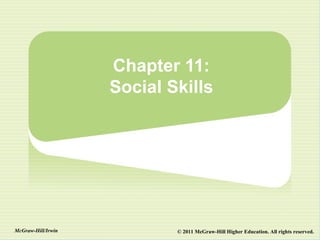
Infants, Toddlers & Caregivers Ch 11
- 1. Chapter 11: Social Skills McGraw-Hill/Irwin © 2011 McGraw-Hill Higher Education. All rights reserved.
- 2. What is Socialization? • Socialization: – The process of learning the standards and expectations of a specific culture – Learning social skills is part of the socialization process. – Children need the care and support of trusted adult during this process. 11-2
- 3. Early Social Behaviors • Attachment is prime factor in the development of social skills. – Another early social behavior is imitation. – Early smiling is also a social behavior. – Within first few months, infants are effective at non- verbal communication and have attached themselves to specific people. 11-3
- 4. Stages of Psychosocial Development • Erickson’s first three stages include: – Trust versus mistrust – Autonomy versus shame and doubt – Initiative versus guilt 11-4
- 5. Trust • Trust is the first stage of psychosocial development. • If infants’ needs are consistently met, they learn to develop a sense of basic trust. • Part of developing trust means coping with separation. 11-5
- 6. Separation • Helping children through separation involves: – Being honest and stating facts (including emotional facts) – Offering support – Welcoming things from home – Allowing children individual ways of feeling comforted 11-6
- 7. Separation • Sometimes adults have a difficult time dealing with children's separation issues. • Parents have separation anxieties of their own. • Separation involves a range of feelings How do you deal with separation? 11-7
- 8. Autonomy • Autonomy is Erickson’s second stage of psychosocial development. – Autonomy occurs when an infant has reached his or her second year. – When infants become toddlers, they begin to perceive themselves as individuals. – Children begin to learn self-help skills during this stage. 11-8
- 9. Autonomy • Toddlers’ “NO!” is a sign of developing autonomy. • Rejecting behaviors are normal for toddlers. They show developing independence. • By capitalizing on toddlers’ drive for independence, you can promote the development of self-help skills. 11-9
- 10. Autonomy • Independence in toilet training (which is part of a child’s growing autonomy) depends on: – Physical control – Cognitive understanding – Emotional willingness 11-10
- 11. Initiative • Initiative is Erickson’s term for the stage during which older toddlers create, invent, and explore. • Caregivers should respond to initiative by providing information, resources, freedom, and encouragement. 11-11
- 12. Guidance and Discipline • Guidance and discipline are part of the on-going process of teaching social skills to children. – Guidance is the philosophical approach to teaching the standards and expectations of your culture. – Discipline means the specific techniques used to accomplish this task. • One’s guidance philosophy determines ones discipline techniques. 11-12
- 13. Security and Control for Infants • Guidance in the first year must be accepting and trust building. • Infants do not require discipline because their limits come naturally from their own limitations. 11-13
- 14. Limits for Toddlers • Toddlers need to know that there are limits. • Limits are rules of behavior. How do limits provide security? 11-14
- 15. Biting • To address biting: – Know why the child is biting by learning what is behind the behavior 11-15
- 16. Biting • Reasons for biting include: – Expressions of anger – Expressions of curiosity – Means for gaining attention – A need for a strong interaction 11-16
- 17. Biting • The best way to stop biting is to prevent it! • When a child is biting (or using other aggressive behaviors), try to re-direct the urge to a positive expression of the underlying emotion. 11-17
- 18. Negativism • If you want to stop negativism, avoid challenges. • Try stating limits in positive terms. What are some positive ways to tell a child to “get off of the table”? 11-18
- 19. Guidance and Discipline • General considerations related to guidance and discipline that should be considered: – Plan your environment; avoid trouble spots – Appreciate uniqueness of each child – Natural consequences are sometimes the best teacher – Avoid any discipline technique that inflict pain – Cultivate family-caregiver partnerships – Model behavior you want to teach 11-19
- 20. Teaching Prosocial Behavior • Prosocial Behavior: – Must be taught – Should be modeled by caregivers – Helps children care about other children – Depends on cooperation • Cooperation can be taught through everyday caregiving tasks. 11-20
- 21. The Special Need of All Children • Self-esteem is a special need of all children. • Self-esteem is the valuing of the self. • Self-esteem stems from secure and nurturing attachment during infancy. • For toddlers, self-esteem is related to the successful completion of tasks. • Adults who feel good about themselves tend to pass that feeling on to children. 11-21
- 22. Online Learning Center • See Chapter 11 of the text’s Online Learning Center for chapter quizzes, Theory Into Action activities, Video Observations, and more. 11-22
